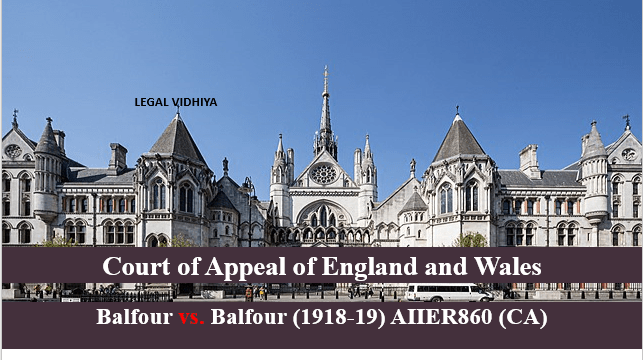
| Citation | 2.K.B. 571 (Court of Appeal 1919) |
| Date of Judgement | 25th June 1919 |
| Court | Court of Appeal of England and Wales |
| Case Type | Maintenance |
| Plaintiff | Mrs. Balfour (Wife) |
| Defendant | Mr. Balfour (Husband) |
| Bench | Warrington LJ , Duke LJ , Atkin LJ |
BRIEF FACT SUMMARY
A husband promised to pay his wife a £30 per month allowance . The wife sued her husband to enforce the promise.
RULE OF LAW
Agreements between husband and wife to provide monies are generally not contracts because generally the “parties“ do not intend that they should be attended by legal consequences .”
FACTS
The Plaintiff and the Defendant were a married couple . The Defendant husband and the Plaintiff wife lived in Ceylon where the Defendant worked . In 1915 , while the Defendant was on leave , the couple returned to England. When it was time to return to Ceylon , the Plaintiff was advised not to return because of her health she was in urgent need of medical attention . Then they decided and made an agreement that shall stay back until she recovers from her illness . Prior to the Defendant returning , he promised to send the Plaintiff £30 per month as support . The parties’ relationship deteriorated and the parties began living apart . The Plaintiff brings suit to enforce the Defendant’s promise to pay her £30 per month . The lower court found the parties’ agreement constituted a contract.
But , slowly and gradually their relationship deteriorated which resulted in non-payment of the amount of maintenance by Mr. Balfour to Mrs. Balfour . Mrs. Balfour decided to seek to enforce the agreement and moved to the court . Mr. Balfour wrote a letter to his wife suggesting to make their separation permanent .
And at a later point of time they separated legally, that means they were divorced . Mrs. Balfour had brought the action against Mr. Balfour for non-payment of the amount he was supposed to pay in court of law in the year 1918.
ISSUES
- Did Mr. Balfour ever intend to enter into any sort of agreement with his wife , Mrs. Balfour?
- Is the agreement between Mr. And Mrs. Balfour valid in nature at all ?
- Does the contract between husband and wife enforceable in court of law
ARGUMENTS
The court first recognized that certain form of agreements do not reach the status of a contract . In such agreements, one party is give a certain sum of money on a daily , weekly , monthly , etc… This agreement is sometimes termed an allowance . It was held that the characterstics of the agreement was purely and completely domestic in nature, Lord Justice Atkin held that when a husband and a wife enter into an agreement they never intend to create a legal relationship .
Moreover, a court will never take into account the domestic agreements between spouses made in the daily course of life .
Initially when Mrs. Balfour had moved to the court in order to seek her maintenance , an additional judge of king Bench division presided by Justice Sargant , held that the husband is indeed liable and is under obligation to provide maintenance and support to his wife . The Defendant’s promise to pay the maintenance was enforceable.
The consideration to the agreement of monthly transfer of the amount of money was lawful and held binding obligations. So, in the month of July , 1919 she received the decree nisi and subsequently in the month of December, the order for alimony .
The Court makes an interesting argument in not enforcing these types of promises. The Courrt argues that if these promises are treated as contracts the floodgates will open .
JUDGEMENT
As mentioned above , the agreement was not legally binding , the agreements made in personal family relationships are not counted in law of contract, the agreements made between spouses to provide capitals or monetary benefits does not hold any legally binding authority . Generally , spouses or parties to marriage do make arrangements for personal and household expenses , but there is never a legal instinct in those things .
The Court of Appeal had unanimously ruled that there was no such enforceable agreement between Mr. Balfour and Mrs. Balfour . Subsequently , Mr. Balfour was allowed . Basically , the law revolves around the concept that there must be an intention on the part of both the parties to create a legal relationship or not is determined by examining the circumstances that existed , under which the execution of the contract was done .
REFERENCE
https://www.legalserviceindia.com
This Article is written by Anshika Aggrawal of Shri Varshney College , Intern at Legal Vidhya.




0 Comments